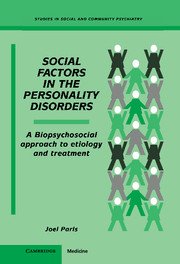Book contents
- Frontmatter
- Contents
- Foreword
- Introduction
- Acknowledgments
- 1 Overview
- 2 Personality Traits and Personality Disorders
- 3 Biological Factors
- 4 Psychological Factors
- 5 Social Factors – Methods
- 6 Social Factors – Mechanisms
- 7 A Biopsychosocial Model of the Personality Disorders
- 8 The Odd Cluster
- 9 The Impulsive Cluster
- 10 The Anxious Cluster
- 11 Treatment
- 12 Clinical Practice
- Epilogue: Summary and Research Implications
- References
- Index
12 - Clinical Practice
Published online by Cambridge University Press: 05 May 2010
- Frontmatter
- Contents
- Foreword
- Introduction
- Acknowledgments
- 1 Overview
- 2 Personality Traits and Personality Disorders
- 3 Biological Factors
- 4 Psychological Factors
- 5 Social Factors – Methods
- 6 Social Factors – Mechanisms
- 7 A Biopsychosocial Model of the Personality Disorders
- 8 The Odd Cluster
- 9 The Impulsive Cluster
- 10 The Anxious Cluster
- 11 Treatment
- 12 Clinical Practice
- Epilogue: Summary and Research Implications
- References
- Index
Summary
We will now apply the guidelines proposed in the previous chapter, and offer a set of recommendations for clinical practice to help patients make better use of their personality traits. The primary goal of this method is improved adaptations.
Before proceeding, two disclaimers must be registered. First, it is not the intention of the author to describe a new type of psychotherapy. Over the last 50 years, many such proposals have appeared, leading to the creation of innumerable “schools” of therapy. Unfortunately, even when these schools bear new labels, when scrutinized, they usually turn out to be variants of existing therapeutic approaches. The model of therapy being proposed here is in no way meant to be unique!
Second, the ideas to be presented in this chapter reflect the author's clinical experience and his theoretical perspective, but remain unsupported by data. At best, they are consistent with the findings of empirical research. No approach to psychotherapy can be considered as valid without systematic research: we need to manualize methods, and then submit them to rigorous clinical trials.
Unfortunately, as reviewed in the previous chapter, there have been no large-scale studies of the efficacy of psychotherapy for personality disorders. Because of the practical difficulties and expense involved in conducting such research, the data at our disposal derive from brief therapies, which may or may not be applicable to the chronic problems presented by personality disordered patients. Clinical guidelines, including the ones to be presented here, can only be provisional.
- Type
- Chapter
- Information
- Social Factors in the Personality DisordersA Biopsychosocial Approach to Etiology and Treatment, pp. 161 - 188Publisher: Cambridge University PressPrint publication year: 1996

